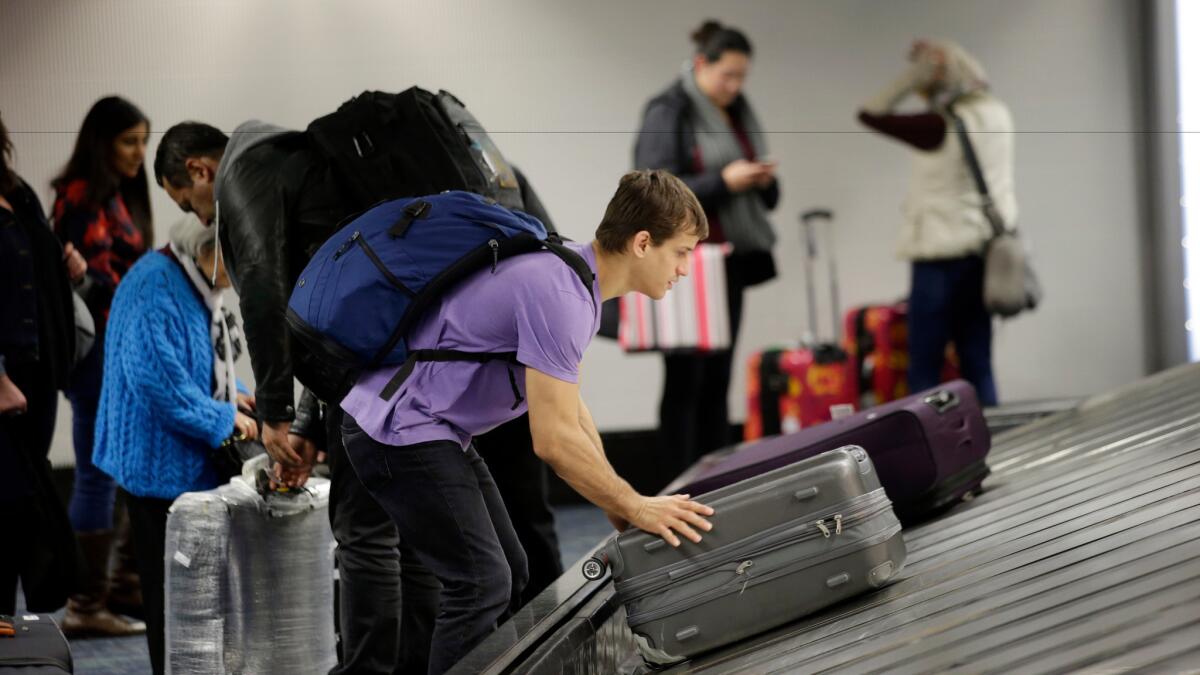Airlines must refund bag fee if your luggage is delayed, Obama administration says

- Share via
If an airline delays returning your luggage after a flight, you will get a refund for your bag fee, under a new set of consumer-protection rules the Obama administration plans to adopt.
Among other changes, the administration is calling on airlines to more accurately report on-time arrival rates, the number of times wheelchair requests are fumbled and the rate of lost or mishandled luggage.
The new regulations, announced Wednesday, are part of a larger effort that began when the Obama administration first took office and vowed to impose tough consumer protection rules on the country’s airlines.
“The travel community is grateful that the administration continues to shine a light on many of the more frustrating issues that ail the air travel experience in the U.S.,” Roger Dow, chief executive of the U.S. Travel Assn., the trade group for the nation’s travel industry, said in response to the new rules.
But a trade group for the nation’s airlines warned that too many regulations could backfire and not achieve the desired results.
“Efforts designed to re-regulate how airlines distribute their products and services are bad for airline customers, employees, the communities we serve and our overall U.S. economy,” said Nicholas Calio, president and chief executive of Airlines for America.
Airlines are already required by the Department of Transportation to reimburse checked bag fees if a bag is lost. Under the new rules, airlines would have to refund the fees if a bag is “substantially delayed,” though the term has yet to be defined.
The new rules also aim to give travelers a better understanding of how well airlines handle luggage by requiring them to report the total number of bags checked by travelers, in addition to the bags lost and mishandled. That will allow the transportation department to calculate the rate of lost and mishandled luggage for each airline.
The calculation of on-time arrival and departure times also will be tightened to include performance data for all planes that fly for an airline, including small regional carriers that often don’t perform as well.
The new rules extend to online travel agents, who would be required to disclose any bias based on financial arrangements for offering flights to consumers on behalf of certain airlines.
See the most-read stories this hour »
The new reporting requirements will take effect Jan. 1, 2018; the other regulations will take effect 30 days after the changes are published in the Federal Register.
The most dramatic previous rule change came in 2009 when the transportation department adopted stiff fines for airlines that keep passengers stranded on flights delayed on an airport tarmac for more than three hours. In 2011, that rule was extended to international flights that strand passengers for more than four hours.
As a result, reports of stranded passengers have dramatically declined.
To read more about the travel and tourism industries, follow @hugomartin on Twitter.
MORE BUSINESS NEWS
Aliso Canyon leak prompts feds to recommend dozens of safety changes
Wanda Group hires former Disney executive in battle over Chinese theme parks
Yahoo remains tight-lipped about Verizon deal in third-quarter earnings report
More to Read
Inside the business of entertainment
The Wide Shot brings you news, analysis and insights on everything from streaming wars to production — and what it all means for the future.
You may occasionally receive promotional content from the Los Angeles Times.











